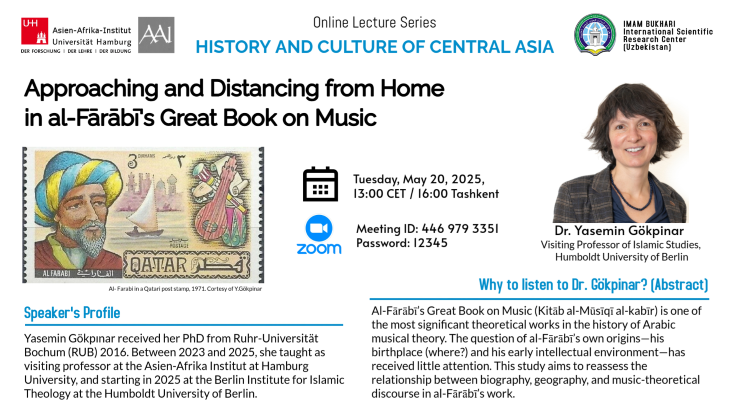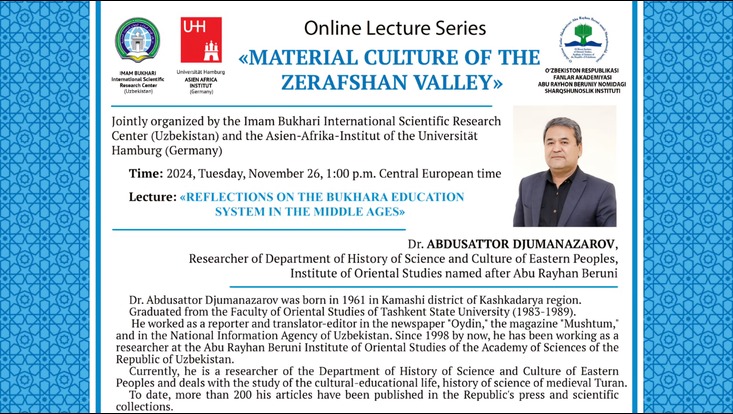Lecture Series on the History and Culture of Central Asia - 9th Edition
Lecture Series on the History and Culture of Central Asia
During the summer 2025, the ninth edition of our lecture series will take place. As usual the series consists of four lectures and takes place online via Zoom.
April 22, 2025 - Shamsiddin Kamoliddinov - "Historical names of Central Asian Regions"
We cordially invite to our first lecture of this summer term's series on the history and culture of the Central Asia The lecture will be presented by Prof. Dr. Shamsiddin Kamoliddinov, Tashkent State Institute of Oriental Studies.
- Topic: Historical Names of Central Asian Regions
- Date: April 22th, 2025, 13:00 CET
- Place: online via ZOOM
About the speaker:
Kamoliddin Shamsiddin Sirojiddin Ogly is a Doctor of Sciences in Historical and Oriental Studies and a Professor at the Tashkent State Institute of Oriental Studies, specializing in early medieval history and historical geography of Central Asia. He graduated from the Oriental Faculty at Tashkent State University in 1980, with a PhD focused on Abu Sa‘d al-Sam‘ani's "Kitab al-Ansab" (1988) and a post-doc on Arabic sources regarding Tokharistan and Southern Soghd (1993).
He specializes in the early medieval history and historical geography of Central Asia, focusing on the period from the Turkic Qaghanate (6th – 8th centuries AD) to the pre-Mongol era (9th – early 13th centuries AD), utilizing Arabian, Persian, and Turkic sources. He has authored over 40 books in Uzbek, Russian, and English, as well as approximately 300 articles in these languages, along with Arabic. Some of his articles have also been translated into Hungarian, Chinese, and Turkish.
In recognition of his contributions to Islamic studies, he received the special International Award from Sheikh ‘Abd al-‘Aziz al-Baptin, "For Descendants of Imam al-Bukhari," in 1999 (Kuwait). He is a member of the Islamic Manuscripts Association (Cambridge, 2010) and the International Society of Arabic Papyrology (Leiden, 2012). He has served on the advisory boards of several journals, including “Moziydan Sado” / “Echo of History” / “Эхо истории” in Tashkent, Uzbekistan (since 2012), “Vodiynoma” in Andijon, Uzbekistan (since 2016), and The Journal of Islamic Research / Islami Araştirmalar Dergisi at the University of Ankara, Turkey (since 2019).
Participation:
In order to participate, please click here or use the following Zoom credentials:
Meeting ID: 446 979 3351
Password: 12345
May 20, 2025 - Yasemin Gökpinar - "Approaching and Distancing from Home in al-Fārābī's Great Book on Music"

We would like to invite you to the next lecture in our series on the history and culture of Central Asia, with a special focus on the Zerafshan Valley, which we're also offering this summer term. The second lecture of this semester, "Approaching and Distancing from Home in al-Fārābī's Great Book on Music" will be presented by Dr. Yasemin Gökpinar, visiting professor at Humboldt University of Berlin.
- Topic: Approaching and Distancing from Home in al-Fārābī's Great Book on Music
- Speaker: Dr. Yasemin Gökpinar, visiting Professor for Islamic Studies, Humboldt Unviersity of Berlin
- When?: May 20th, 2025, 13:00 CET, 16:00 Tashkent Time
- Where?: Online via ZOOM
Why to listen to Dr. Gökpinar:
Al-Fārābī’s Great Book on Music (Kitāb al-Mūsīqī al-kabīr) is one of the most significant theoretical works in the history of Arabic musical theory. The question of potential references to al-Fārābī’s own origins—his birthplace (where?) and his early intellectual environment—has received little attention. This paper explores whether and how notions of proximity and distance, both literal and metaphorical, shape the structure, content, and conceptual framework of the Great Book on Music. Does al-Fārābī’s engagement with musical thought reflect traces of his homeland, or does it rather indicate a conscious intellectual distancing? By examining key passages of the text in their historical and philosophical context, this study aims to reassess the relationship between biography, geography, and music-theoretical discourse in al-Fārābī’s work.
Speakers Profile:
Yasemin Gökpınar combines the study of Islamic philosophy and manuscript culture with musicology. In 2016 she received her PhD from Ruhr-Universität Bochum (RUB). Between 2018 and 2023, she held the position of an executive assistant the RUB and while at the same time being research associate at the ERC project “Ancient Music Beyond Hellenization” at the Academy of Sciences (ÖAW) in Vienna. Between 2023 and 2025, she taught as visiting professor at the Asien-Afrika Institut at Hamburg University, and starting in 2025 at the Berlin Institute for Islamic Theology at the Humboldt University of Berlin.
Participation:
In order to participate, please click here or use the following Zoom credentials:
Meeting ID: 446 979 3351
Password: 12345
June 10, 2025 - Dr. Alisher Sandibayev
July 15, 2025 - N.N.

Since the winter semester of 2020/2021, the İmam Bukhari International Scientific Research Center, in collaboration with the Department of Islamic Studies at the Asien-Afrika-Institut (Universität Hamburg) organizes a joint lecture series on the history and culture of Central Asia.
This term's series kicked off on November 26th, 2024 with the lecture of Dr. Abdusattor Djumanazarov, Researcher of the Department of the History of Science and Culture of Eastern People at the Institute of Oriental Studies named after Abu Rayhan Beruni on "Reflections on the Bukhara Education System in the Middle Ages"
Abstract:
This presentation is devoted to the history of Bukhara, its educational system and its madrasah institutes. The research on this topic began at the end of the 20th century. At the first stage of the research it was recognized that from the beginning of the 9th to the twentieth century about 350 higher educational institutions of various academic levels, libraries and hundreds of schools operated in the city and adjacent districts of Bukhara.
Profile of the lecturer:
Dr. Abdusattor Djumanazarov was born in 1961 in Kamashi district of Kashkadarya region. He graduated from the Faculty of Oriental Studies of Tashkent State University in 1989. At first he worked as a reporter and translator-editor in the newspaper "Oydin", the magazine "Mushtim" and in the National Information Agency of Uzbekistan. Since 1998 he has been working as a researcher at the Abu Rayhan Beruni Institute of Oriental Studies of the Academy of Sciences of the Republic of Uzbekistan. Currently, he is studying the cultural-educational life and the history of science of medieval Turan, the Turkic-speaking Central Asia. To date, more than 200 of his articles have been published in the press and scientific collections.
